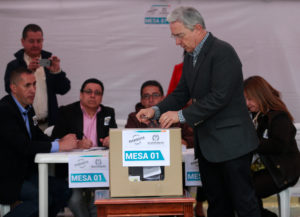
Colombia: In search of Plan B
On several occasions, during the weeks prior to the plebiscite, President Santos said that he didn’t have a Plan B in case voters said “No” to the peace accord, so great was his confidence that the vote would culminate in support for the negotiations with the FARC.
That expectation relied on surveys that maintained as a constant that the “Yes” vote would triumph, despite a heavy turnout by its opponents.
However, reality imposed Plan B. Everybody knows that Plan B is coming although nobody knows what it will be.
The Colombian president has already ratified a bilateral ceasefire. Timochenko, the leader of the FARC, has confirmed that the guerrillas persist in their intention to advance toward peace.

But seated now at the table is no less than former President Álvaro Uribe, the visible leader of the opposition to the accord, spearhead of the “No” campaign, and the plebiscite’s clear winner.
Uribe has said that he favors not the war but a renegotiation of the accord.
The accord is based on a fabric of multiple concessions that hold one another up. To remove a part is to cause the collapse of the entire agreement.
Furthermore, both the government and the FARC rule out a renegotiation of the terms reached in Havana.
Paradoxically, both the FARC and Uribe have proposed a Constituent Assembly as a mechanism to culminate the agreements.
Is that the road ahead? Or do we see an extensive quagmire of ungovernability? How will Santos reach the end of his term in 2018? Is the risk of renewed violence real?
At this time, the only outcome that is clear is that Santos’ attempt to benefit from a popular support for the accord has failed; that the application of the pact remains uncertain; and that a wide parenthesis must be made to find a way out of the maze.
Photo at top: President Santos and his negotiating team after the plebiscite that rejected the peace accord with the FARC.
(From Arreola’s blog Del Gran Caribe.)


